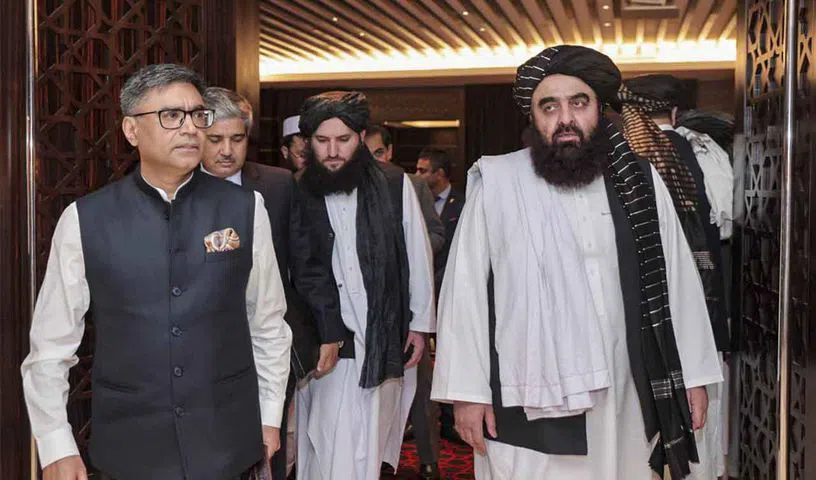
The recent meeting between Foreign Secretary Vikram Misri and acting Foreign Minister of Afghanistan Amir Khan Muttaqi in Dubai reflects pragmatic diplomacy
The Taliban are here to stay. It’s a geopolitical reality that the neighbours need to reconcile with. For countries like India, it would be prudent to engage with the ultra-orthodox regime rather than wait indefinitely for the restoration of democracy in Kabul. It is particularly desirable because China and Russia have been quick off the blocks on the Afghan front. The Taliban, though still deprived of international legitimacy, are making their presence felt by gaining the support of key regional players. India’s decision to step up engagement with the Taliban is a welcome development. The recent meeting between Foreign Secretary Vikram Misri and acting Foreign Minister of Afghanistan Amir Khan Muttaqi in Dubai reflects pragmatic diplomacy driven by strategic and security interests. It highlights India’s acknowledgement of the basic geopolitical reality of the subcontinent. The meeting marks a pivotal moment for bilateral ties as well as multilateral equations. New Delhi has signalled that its strategic and economic interests will take precedence over everything else. When the Taliban stormed back into power in August 2021, following the withdrawal of the American troops from the war-torn country, it was widely seen as a major setback to India’s regional policy and a big gain for Pakistan. However, since then, the Taliban regime has consistently signalled its eagerness to improve relations with India, while the relationship with Islamabad has steadily deteriorated. Shedding its initial hesitation, New Delhi is now opening up to the changed realities.
The bilateral engagement has now been upgraded to the level of foreign secretary. India has also favourably responded to requests from Kabul for humanitarian assistance and developmental cooperation. India and Afghanistan share a deep cultural bond between their people, irrespective of the nature of the regime in Kabul. Afghanistan has long resented the Pakistan army’s brazen meddling in its internal affairs and treating Afghanistan as its backyard. Kabul has looked to Delhi to balance the pressures from Rawalpindi. Pakistan has sought to break this paradigm by conscious efforts to promote radical Islam in Afghanistan and groom the Taliban as an anti-Indian force. That policy has failed one more time. The tensions between Kabul and Rawalpindi have not disappeared. Pragmatism must drive India’s efforts to strengthen the relations with Afghanistan where Indian companies are executing several key infrastructure and other development projects. However, New Delhi must continue to mount pressure on the Taliban regime to ensure equal rights to all citizens and put an end to the oppression of women who are being denied basic rights such as education and minimal personal freedoms. While India does not have the power to alter the internal politics of Afghanistan, it must, nevertheless, nudge the Taliban towards political and social moderation. The Dubai meeting affirms the fact that India can work with the United Arab Emirates and other moderate Arab states in promoting positive changes inside Afghanistan.







